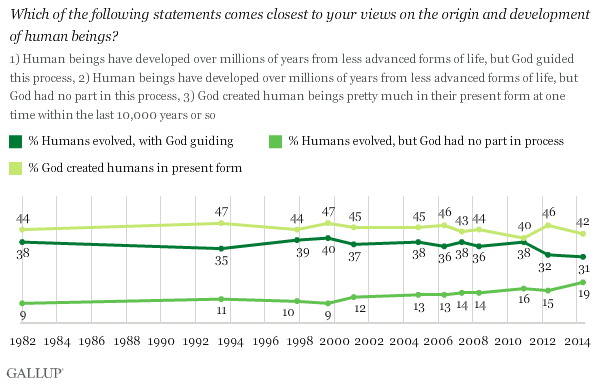By Glynn Wilson –
The number of Americans who understand that humans evolved over time with no god involved in a so-called creation process has doubled since 1999, leading public opinion experts to conclude that a little evolution in human intelligence may be occurring in the 21st century.
According to the latest Gallup poll on the subject, about 40 percent of Americans continue to believe that God created humans in their present form 10,000 years ago, an uneducated view based on an ignorance of science.
At least a majority of 51 percent of Americans believe humans evolved, although some still cling to the notion that a god guided the evolutionary process.
“However,” according to Gallup, “the percentage who say God was not involved is rising … the percentage of Americans who adhere to a strict secularist viewpoint — that humans evolved over time, with God having no part in this process — has doubled since 1999.”
The percentage of the U.S. population choosing the creationist perspective as closest to their own view has fluctuated in a narrow range between 40 percent and 47 percent since the question was first asked in 1982.
Historically, Americans’ views on the origin of humans have been related to their religiousness, education and age, demographic variables employed by social scientists to analyze differences in opinions in a poplulation.
“Religiousness relates most strongly to these views, which is not surprising, given that this question deals directly with God’s role in human origins,” Gallup says in its analysis.
The founder of the Gallup Poll, George Gallup, was a religious man himself who had a social scientists interest in learning about Americans’ views on the subject.
The percentage of Americans who accept the creationist viewpoint ranges from 69 percent among those who attend religious services weekly to 23 percent among those who seldom or never attend.
Educational attainment is also related to these attitudes, with belief in the creationist perspective dropping from 57 percent among Americans with no more than a high school education to less than half that, 27 percent, among those with a college degree.
“Those with college degrees are, accordingly, much more likely to choose one of the two evolutionary explanations,” Gallup says.
Younger Americans — who are typically less religious than their elders — are less likely to choose the creationist perspective than are older Americans. Americans aged 65 and older — the most religious of any age group — are most likely to choose the creationist perspective.
Americans’ self-reported familiarity with evolution as an explanation for the origin and development of life on Earth has stayed roughly the same over the past seven years. Seventy-nine percent of Americans say they are very or somewhat familiar with it, leaving 19 percent not too or not familiar at all.
However, according to Gallup, significantly fewer Americans claim familiarity with “creationism” than seven years ago. In 2007, 86 percent were familiar with the creationism myth, including 50 percent who were very familiar. Now, only 76 percent report that they are familiar with creationism, which may be a result of a drop in media coverage of controversies related to it in the past decade.
A number of states have been embroiled in fights in recent years over the degree to which evolution and creationism should be included in their public school curricula. But those fights are mostly in the American South, where education levels lag behind the rest of the country and where a higher percentage of the population is likely to believe in the creationist view than those living in other regions.
“In short, even though the adherence to the creationist view has not changed (much) over time, familiarity with the term ‘creationism’ has diminished,” Gallup says.
On the other hand, 64 percent of those who are very familiar with the theory of evolution choose one of the two evolutionary explanations for the origin of humans, compared with 28 percent among the smaller group of Americans who report being not too or not at all familiar with it. Not surprisingly, the majority of those not familiar with evolution choose the creationist viewpoint.
“These relationships do not necessarily prove that if Americans were to learn more about evolution they would be more likely to believe in it,” Gallup says, although it is not clear how the polling outfit can logically come to that conclusion. Sometimes education does work.
“Those with less education are most likely to espouse the creationist view and to be least familiar with evolution,” Gallup says. “Few scientists would agree that humans were created pretty much in their present form at one time 10,000 years ago, underscoring the ongoing discontinuity between the beliefs that many Americans hold and the general scientific consensus on this important issue.”
Survey Methods
Results for this Gallup poll are based on telephone interviews conducted May 8-11, 2014, with a random sample of 1,028 adults, aged 18 and older, living in all 50 U.S. states and the District of Columbia. For results based on the total sample of national adults, the margin of sampling error is ±4 percentage points at the 95% confidence level.
Before you continue, I’d like to ask if you could support our independent journalism as we head into one of the most critical news periods of our time in 2024.
The New American Journal is deeply dedicated to uncovering the escalating threats to our democracy and holding those in power accountable. With a turbulent presidential race and the possibility of an even more extreme Trump presidency on the horizon, the need for independent, credible journalism that emphasizes the importance of the upcoming election for our nation and planet has never been greater.
However, a small group of billionaire owners control a significant portion of the information that reaches the public. We are different. We don’t have a billionaire owner or shareholders. Our journalism is created to serve the public interest, not to generate profit. Unlike much of the U.S. media, which often falls into the trap of false equivalence in the name of neutrality, we strive to highlight the lies of powerful individuals and institutions, showing how misinformation and demagoguery can harm democracy.
Our journalists provide context, investigate, and bring to light the critical stories of our time, from election integrity threats to the worsening climate crisis and complex international conflicts. As a news organization with a strong voice, we offer a unique, outsider perspective that is often missing in American media.
Thanks to our unique reader-supported model, you can access the New American journal without encountering a paywall. This is possible because of readers like you. Your support keeps us independent, free from external influences, and accessible to everyone, regardless of their ability to pay for news.
Please help if you can.
American journalists need your help more than ever as forces amass against the free press and democracy itself. We must not let the crypto-fascists and the AI bots take over.
See the latest GoFundMe campaign here.
Don't forget to listen to the new song and video.
Just because we are not featured on cable TV news talk shows, or TikTok videos, does not mean we are not getting out there in search engines and social media sites. We consistently get over a million hits a month.
Click to Advertise Here















